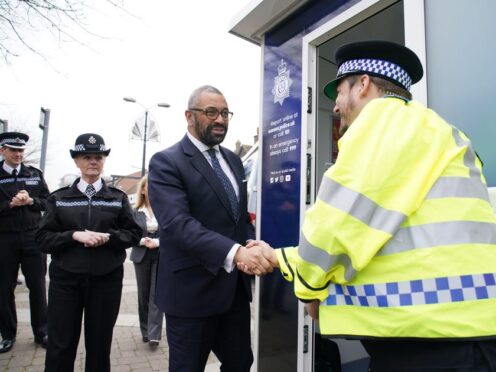
The Home Secretary has vowed to crack down on spiking as he said perpetrators will be “held to account” by changes in the law.
James Cleverly said the Government is updating legislation to make it clear that spiking is a crime, as he visited officers during the first national week of action against spiking.
Spiking Intensification Week, which runs from March 18 to 24, aims to boost police investigations of the crime such as early reporting and police forensic testing.
Spiking is already illegal and happens when someone puts alcohol or drugs into another person’s drink or body without their knowledge or consent.
According to the National Police Chiefs’ Council (NPCC), forces receive 561 reports of spiking per month but it is believed to be underreported because of harmful “myths and stereotypes” against victims.
Mr Cleverly told reporters: “The sad truth is we know this is a crime that has been habitually underreported, but we know it is very prevalent. We’ve had something in the region of 560 reported incidents per month. But as I said, we know that is underreporting.
“We know that we have to protect women and girls who are predominantly the victims of this crime type, which is why we’re taking this so seriously.”
Mr Cleverly accompanied Sussex Police officers on Crawley High Street on Thursday to see the work being done by forces to tackle the crime.
The visit comes as the Home Office announced a number of measures in December to tackle spiking, including training door staff in the night-time economy to spot perpetrators and investing in research into fast spiking test kits to help quick detection of spiking by police.

The cabinet minister added: “We know that with the drugs that are prevalent in spiking, that speed is of the essence.
“And of course, what we’re doing is we’re updating the legislation to make it clear and unambiguous that spiking is a crime. We prioritise the prevention of crimes against women and girls, and the people who perpetrate spiking will be held to account.”
The NPCC said all forces in England and Wales have taken part in the week of action, with some forces including Leicestershire Police, Humberside Police and West Mercia Police receiving a further cash boost for action such as increased street patrols.
Sussex Police Assistant Chief Constable, Paul Court, told the PA news agency that forces want to give people the confidence and reassure them that if they have been a victim of spiking to report it to the police as soon as possible.
He said: “There’s a lot of activity going on across night time economy so where people are drinking in bars and pubs across towns across Sussex they’re going to see enhanced police presence.
“We’re reminding people of the importance of this and actually, if you’re intent on committing this crime, we’re going to bring you to justice through an investigation.
“The key message that I want people to know is you will be supported. We’ve got teams ready to investigate this and to come forward and tell us what’s happened.”
NPCC’s violence against women and girls chief, Assistant Chief Constable Samantha Millar, added: “Spiking can have a significant, traumatic impact on victims and feelings of safety in the night-time economy, particularly for women and girls.
“Spiking is a complex offence to investigate, which is why quick reporting and early evidence gathering is key, particularly police forensic testing.
“It’s really important that young people in particular are aware of the symptoms of spiking and feel confident in reporting it to the police, should it happen to them or someone they know.”

Enjoy the convenience of having The Sunday Post delivered as a digital ePaper straight to your smartphone, tablet or computer.
Subscribe for only £5.49 a month and enjoy all the benefits of the printed paper as a digital replica.
Subscribe